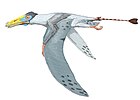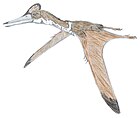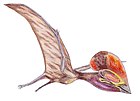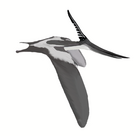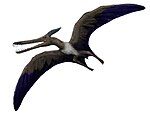Wukongopterus
| Wukongopterus Temporal range: Middle or Late Jurassic,
| |
|---|---|

| |
| Holotype, Paleozoological Museum of China | |
| Scientific classification | |
| Kingdom: | Animalia |
| Phylum: | Chordata |
| Order: | †Pterosauria |
| Family: | †Wukongopteridae |
| Subfamily: | †Wukongopterinae |
| Genus: | †Wukongopterus Wang et al., 2009 |
| Species: | †W. lii
|
| Binomial name | |
| †Wukongopterus lii Wang et al., 2009
| |
Wukongopterus is a genus of basal pterosaur, found in Liaoning, China, from the Daohugou Beds, of the Middle or Late Jurassic. It was unusual for having both an elongate neck and a long tail.[1]

The genus was described and named in 2009 by , Alexander Kellner, and . The genus name is derived from Sun Wukong, the Monkey King, the main hero of the Chinese classic novel Journey to the West, and a Latinized Greek pteron, "wing". The specific name honours , senior preparator of the Institute of Vertebrate Paleontology and Paleoanthropology (IVPP).[1]
The genus is based on holotype IVPP V15113, a nearly complete but compressed skeleton lacking the back and middle of the skull. The type individual appears to have broken its shin during life. Its wingspan is estimated at 730 millimeters (29 in). Wukongopterus also may have had an uropatagium, a membrane between the hind legs.[1]
Classification[]
Below is a cladogram following Wang et al. (2017) [2]
| Monofenestrata |
| |||||||||||||||||||||||||||||||||||||||
See also[]
- Timeline of pterosaur research
- Darwinopterus
- List of pterosaur genera
- Daohugou Beds
- 2009 in paleontology
References[]
- ^ a b c Wang X.; Kellner, A. W. A.; Jiang S.; Meng X. (2009). "An unusual long-tailed pterosaur with elongated neck from western Liaoning of China". Anais da Academia Brasileira de Ciências. 81 (4): 793–812. doi:10.1590/S0001-37652009000400016. PMID 19893903.
- ^ Wang, X.; Jiang, S.; Zhang, J.; Cheng, X.; Yu, X.; Li, Y.; Wei, G.; Wang, X. (2017). "New evidence from China for the nature of the pterosaur evolutionary transition". Scientific Reports. 7: 42763. doi:10.1038/srep42763. PMC 5311862. PMID 28202936.
- Monofenestratans
- Jurassic pterosaurs of Asia
- Fossil taxa described in 2009
- Taxa named by Alexander Kellner


